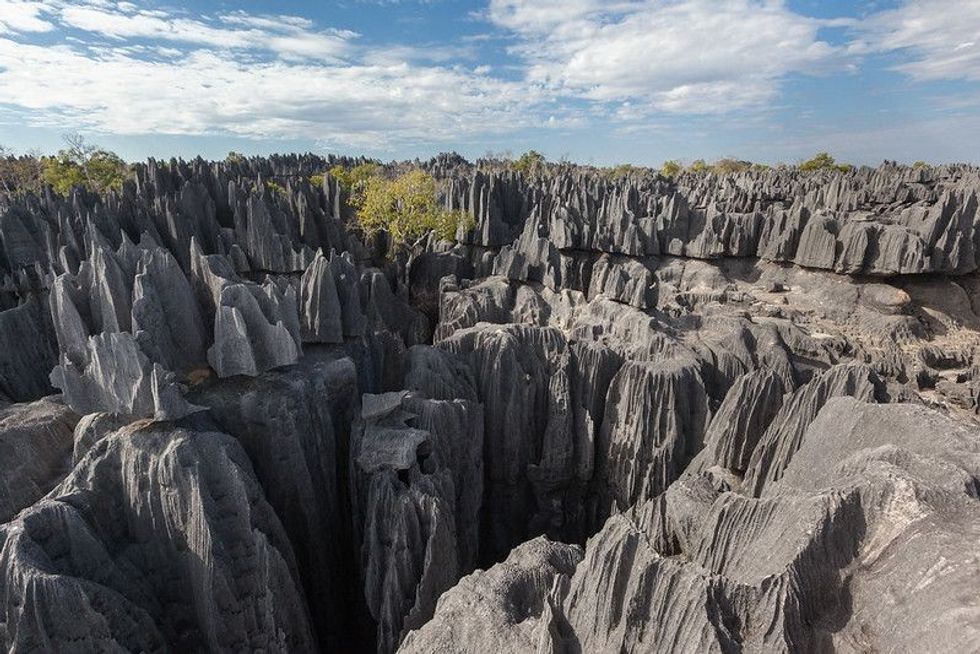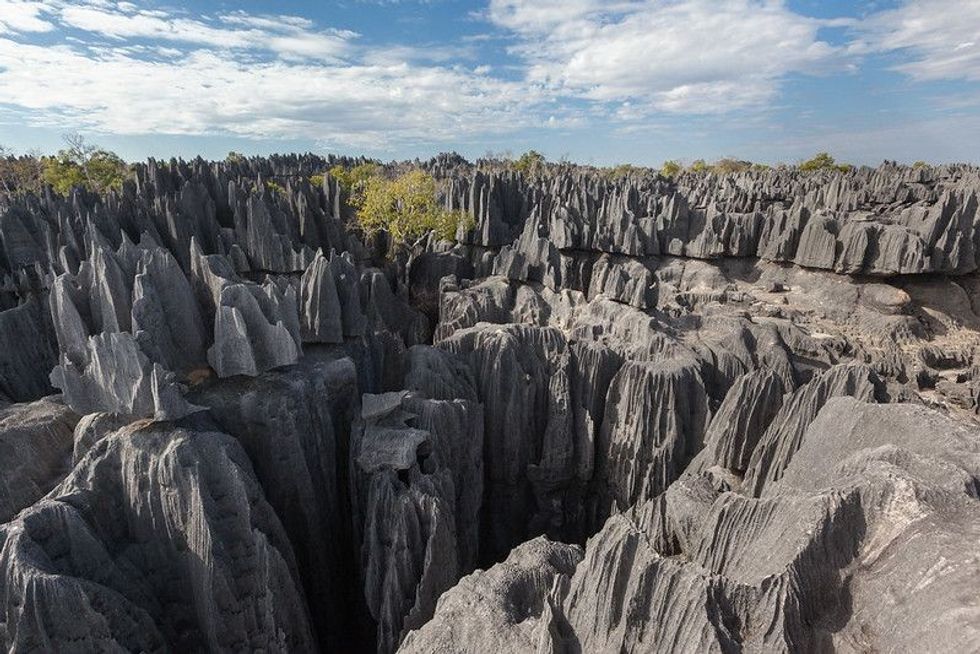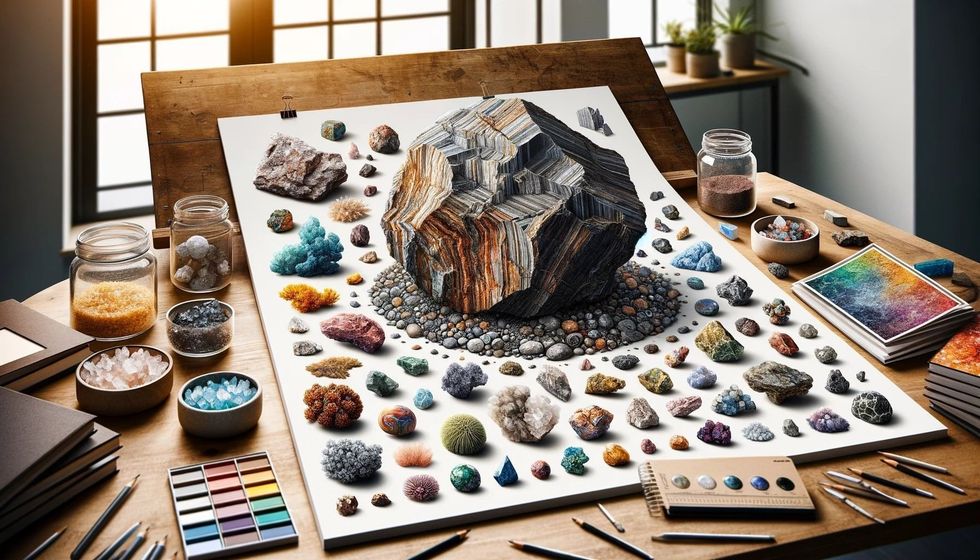Have you ever wondered what makes up the ground beneath your feet or the towering mountains in the distance? The answer is all around: rocks! Rocks are naturally occurring, solid materials that come in various shapes, sizes, and colors. Some can be as smooth as a river stone, while other rocks are rough and jagged like a cliff face.
There are many different rock types, just like there are different types of animals or plants. Some rocks come from molten rock that cools and hardens. Others are created as layers of tiny pieces of surrounding rock are pressed together over time. Rocks can hold clues about the past, and geologists can learn a lot about the Earth's history by examining them.
Get ready to explore the amazing world of rocks! In this article, you will learn about different rock types, the fascinating rock cycle, and how rocks continuously transform. Amazing rock formations can even be found in national parks and other exciting places!
Types Of Rocks Trivia

Test your knowledge about the building blocks of our planet! This trivia will explore the three main types of rocks: igneous, sedimentary, and metamorphic. Get ready to answer questions about how they form, what they look like, and where you might find them.
1. Question: What are the three main types of rock?
Answer: Sedimentary, igneous, and metamorphic.
2. Question: What type of rock is marble?
Answer: Metamorphic.
3. Question: What type of rocks are formed through the gradual accumulation of plant and animal matter, over an extended period?
Answer: Sedimentary rocks.
4. Question: What is the term used to describe the process by which rocks are broken down into smaller pieces?
Answer: Weathering.
5. Question: Rocks that form due to the cooling of molten material are called what?
Answer: Igneous rocks.
6. Question: Granite is an example of a metamorphic rock. True or false?
Answer: False.
7. Question: Sandstone, limestone, and shale are sedimentary rocks. True or false?
Answer: True.
8. Question: What chemical compound is limestone?
Answer: Calcium carbonate.
9. Question: What type of rocks are formed from the alteration of preexisting rocks by heat and pressure?
Answer: Metamorphic rocks.
10. Question: Soil begins with weathered rock particles. True or false?
Answer: True
11. Question: Name the two types of igneous rocks that are found in the world.
Answer: Extrusive (volcanic) and intrusive (plutonic) igneous rocks.
12. Question: What type of rock is also known as the primary rock?
Answer: Igneous.
13. Question: What is formed when limestone undergoes metamorphism?
Answer: Marble.
14. Question: What type of weathering process makes new minerals?
Answer: Chemical
15. Question: Water freezing breaks rocks. True or false?
Answer: True
16. Question: Sedimentary rocks form from cemented sediments. True or false?
Answer: True
17. Question: Marble's color comes from impurities. True or false?
Answer: True
18. Question: What type of rock is formed when sand gets pressed together over time?
Answer: Sandstone, which is a type of sedimentary rock.
19. Question: What do we call the process that turns pebbles and sand into sedimentary rock?
Answer: Compaction and cementation.
20. Question: What type of rock might you get if you apply heat and pressure to sandstone?
Answer: Quartzite.
21. Question: Which rock is commonly used in pencils for writing?
Answer: Graphite, which is a form of the mineral also used in making the 'lead' of pencils.
History Of Rocks
 Shutterstock
ShutterstockDid you know rocks can be like time capsules? Packed with clues, they hold the key to understanding Earth's incredible history. This trivia will test your knowledge of how these fascinating objects form, transform, and reveal the secrets of our planet's past.
22. Question: Which branch of geology studies the history, origin, structure, and chemical composition of rocks?
Answer: Petrology.
23. Question: What is the main component of a rock?
Answer: Minerals.
24. Question: What is the term for a representation of a time-based measure of Earth's rock record?
Answer: Geologic time scale.
25. Question: Where is the oldest rock on Earth located?
Answer: Canada.
26. Question: Radiometric dating is a common method used by geologists to determine the age of rocks. True or false?
Answer: True.
27. Question: What is the primary agent of erosion that contributes to the formation of sedimentary rocks?
Answer: Water.
28. Question: What is the name of the world's largest monolith?
Answer: Mount Augustus.
29. Question: What is the most abundant type of rock on Earth's surface?
Answer: Sedimentary rock.
30. Question: What is the most abundant type of rock in the Earth's crust?
Answer: Igneous rock.
31. Question: In the sequence of sedimentary rock formation, where would you find the oldest rocks formed?
Answer: The bottommost layer.
Uses Of Rocks And Minerals
 Shutterstock
ShutterstockFrom the ground beneath your feet to the gadgets in your hands, rocks and minerals are everywhere! This trivia round will explore the surprising ways you use these natural resources every day.
32. Question: What type of rock is used to produce fertilizers?
Answer: Phosphate rock.
33. Question: What is used in the construction industry for making drywall and plaster and also as a soil amendment in agriculture?
Answer: Gypsum.
34. Question: Which mineral is commonly used in glass production?
Answer: Silica.
35. Question: What type of rock is a key component in cement production?
Answer: Limestone.
36. Question: What is the primary mineral used in manufacturing porcelain?
Answer: Kaolinite
37. Question: Statues can be made using granite, marble, and limestone. True or false?
Answer: True.
38. Question: Which mineral is commonly used in steel production?
Answer: Iron ore.
39. Question: Which sedimentary rock is the main raw material in aluminum production?
Answer: Bauxite.
Bonus Trivia Round

Welcome to the bonus round, where you're taking things beyond the pages of your geography books. These are some serious nuggets of knowledge that only the most interested rock rangers would know. Find out if you have what it takes to crush this final round.
40. Question: What is the term for molten rock found below the Earth's surface?
Answer: Magma.
41. Question: Meteorites are space rocks that land on Earth. True or false?
Answer: True.
42. Question: Name the volcanic rock that floats on water.
Answer: Pumice.
43. Question: What scale is used to determine a rock's hardness?
Answer: Mohs scale.
44. Question: What are the different layers of rocks in a sedimentary rock formation called?
Answer: Beds or strata.
45. Question: Which is the most abundant mineral found in Earth rocks?
Answer: Feldspar.
46. Question: What iconic rock structure is in Australia and sacred to the Aboriginal people?
Answer: Uluru.
47. Question: What famous landmark in the United Kingdom is composed of large standing megaliths or single pieces of massive rocks, arranged in a circular pattern?
Answer: Stonehenge.
48. Question: What is it called when a sedimentary rock forms from pre-existing mineral and rock fragments?
Answer: Conglomerate.
49. Question: Metamorphic rock can be formed from any rock type. True or false?
Answer: True.
FAQs
What age group is this rock trivia suitable for?
This trivia is designed to be fun and informative for kids of all ages! Even younger children can enjoy learning about the different types of rocks and the cool things you can find in them. Older kids can test their knowledge of rock formations and the secrets they hold.
What's the coolest rock out there?
This is a matter of opinion! Some people might think fiery volcanic rocks are the coolest, while others might prefer sparkly gemstones. The coolest rock for you depends on what you find interesting. Do you like smooth beach pebbles or jagged mountain rocks? The best part is there are so many amazing rocks to discover!
Are all rocks old?
Most rocks are very old, some billions of years! But new rocks are still being created today. Lava from volcanoes cools and hardens into igneous rock, and pebbles on a beach can eventually become sedimentary rock.
What precious things can we find in rocks?
Rocks can hold amazing treasures! Gems like diamonds and rubies form under special conditions. Minerals are another kind of treasure found in rocks, and they're used in everything from jewelry to medicine.
What are the different types of rocks?
There are three main types: igneous rocks are formed from hot, molten rock that cools and hardens. Sedimentary rocks are formed from layers of tiny pieces of other rocks, plants, and animals squished together over time. Metamorphic rocks go through a big change when exposed to intense heat or pressure, transforming them into something new!
Can I find rocks with dinosaur fossils anywhere?
Unfortunately, most dinosaur fossils are found in special rock formations that aren't everywhere. However, there are many other cool fossils to be found! You might discover ancient plants, shells, or even footprints preserved in rocks near your home.
Are there any rocks I should avoid touching?
In most cases, it's safe to touch rocks you find outdoors. However, be cautious around areas with known mining or industrial activity. Some rocks might contain harmful substances. If you're unsure, it's always best to admire them from afar.
What's the rarest type of rock on Earth?
The rarest type of rock is believed to be painite. For many years, only a few specimens were known to exist. It's so rare because it's only found in a couple of locations in Myanmar.
Can rocks grow or change shape over time?
Yes, rocks can change over time through processes like weathering, erosion, and metamorphism. While they don't grow like plants or animals, they can transform and reform, changing their shape and composition.
Why do some rocks look like they have layers?
Rocks with layers, known as sedimentary rocks, are formed from sediments like sand, silt, and clay that accumulate in layers over time. These layers get compacted and cemented together, often showing a striped pattern.
This trivia covered the fascinating world of rocks, from their ancient origins to their modern uses. You learned how rocks form, change, and hold clues to Earth's history. The quiz also highlighted the uses of rocks and minerals in everyday life. So, the next time you encounter a rock, take a moment to appreciate the remarkable story it silently tells.
Related Articles Around the Web





 Shutterstock
Shutterstock Shutterstock
Shutterstock




